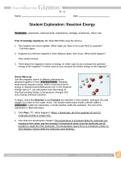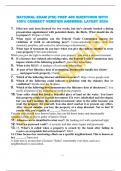MOLECULEN: FYSISCHE CHEMIE – ZELFSTUDIES
ZS 1 – ELEKTROCHEMIE EN MEMBRAAN POTENTIAAL
1. RED: ethanol en OX: acetaldehyde; RED: NADH en OX: NAD+
Dan zou er -0,20 –32= een positief getal. Dus er is een grotere vrije Gibbs energie, waardoor de
reactie niet zal plaatsvinden.
2. H+ gradiënt (oxideren en reduceren; elektronentransport)
3. De drie protonen-pompende eiwitcomplexen heten NADH-Q-oxireductase, Q-cytochrome c
oxireductase en cytochrome c oxidase.
4. De twee elektronen-carriers: Q en cyc. c. C zit op het eiwitcomplex en gaat over het membraan.
Het bevat een ijzergroep en kan hierdoor een e opnemen. Eiwitcomplex Q zit in het membraan en
diffundeert naar de verschillende complexen. Het bevat een FADH2 groep en een ijzergroep en kan
dus elektronen en protonen opnemen.
5. Complex 2 – succinaat dehydrogenase. Deze elektronen worden aan FAD gedoneerd, waardoor
FADH2 ontstaat. (Deze elektronen worden gedoneerd aan Q die ze kan afgeven aan eiwitcomplex 3)
6. De glycoslyse levert 2 NADH op, die in de oxidatieve fosforylering 6 ATP opleveren. Deze 2 NADH
levert eigenlijk maar 4 ATP op, omdat het transport naar de mitochondriën 2 ATP kost.
7. Nee dit zou niet veranderen, het gaat namelijk om de afgegeven elektronen.
8. Wet van behoud van energie
, ZS/WC 2 & ZS/WC 3 – COO: OXIDATIEVE FOSFORYLERING
https://www.bc-uu.nl/oxygraph/?Language=Moleculen
Oxidatieve fosforylering FADH2
How many protons are needed (including transport) to synthesize one ATP? 3 protonen
How many ATP can you produce from one FADH2? 2/3 ATP
Oxidatieve fosforylering NADH
How many protons have been pumped? 10 protonen
How many protons are needed (including transport) to synthesize one ATP? 3 protonen
How many ATP can you produce from one NADH? 2/3 ATP
Hoeveel O2 werd er bij de oxidatie van één NADH en één FADH2 verbruikt? ½ O2
Oxidaties
Biologische oxidaties van het type I, zijn oxidatiereacties waarbij NADH ontstaat.
Biologische oxidaties van het type II, zijn oxidatiereacties waarbij een flavoproteïne wordt
gereduceerd, m.a.w. er ontstaat FADH2.
Omdat per NADH (of FADH2) ½O2 (één O) wordt verbruikt is de P/O-ratio evenredig met de
hoeveelheid ATP die per NADH (of FADH2) kunt maken.
Groene pijl: start ATP-productie; rode pijl: stop ATP-productie
Theoretische P/O-ratio van type 1 oxidatie: 2,5 en voor type 2: 1,5
Rotenon zorgt ervoor dat er geen O2 wordt gebruikt, dit is bij complex 4 (3 e van
ademhalingsketen).
AMP vs ADP
ZS 1 – ELEKTROCHEMIE EN MEMBRAAN POTENTIAAL
1. RED: ethanol en OX: acetaldehyde; RED: NADH en OX: NAD+
Dan zou er -0,20 –32= een positief getal. Dus er is een grotere vrije Gibbs energie, waardoor de
reactie niet zal plaatsvinden.
2. H+ gradiënt (oxideren en reduceren; elektronentransport)
3. De drie protonen-pompende eiwitcomplexen heten NADH-Q-oxireductase, Q-cytochrome c
oxireductase en cytochrome c oxidase.
4. De twee elektronen-carriers: Q en cyc. c. C zit op het eiwitcomplex en gaat over het membraan.
Het bevat een ijzergroep en kan hierdoor een e opnemen. Eiwitcomplex Q zit in het membraan en
diffundeert naar de verschillende complexen. Het bevat een FADH2 groep en een ijzergroep en kan
dus elektronen en protonen opnemen.
5. Complex 2 – succinaat dehydrogenase. Deze elektronen worden aan FAD gedoneerd, waardoor
FADH2 ontstaat. (Deze elektronen worden gedoneerd aan Q die ze kan afgeven aan eiwitcomplex 3)
6. De glycoslyse levert 2 NADH op, die in de oxidatieve fosforylering 6 ATP opleveren. Deze 2 NADH
levert eigenlijk maar 4 ATP op, omdat het transport naar de mitochondriën 2 ATP kost.
7. Nee dit zou niet veranderen, het gaat namelijk om de afgegeven elektronen.
8. Wet van behoud van energie
, ZS/WC 2 & ZS/WC 3 – COO: OXIDATIEVE FOSFORYLERING
https://www.bc-uu.nl/oxygraph/?Language=Moleculen
Oxidatieve fosforylering FADH2
How many protons are needed (including transport) to synthesize one ATP? 3 protonen
How many ATP can you produce from one FADH2? 2/3 ATP
Oxidatieve fosforylering NADH
How many protons have been pumped? 10 protonen
How many protons are needed (including transport) to synthesize one ATP? 3 protonen
How many ATP can you produce from one NADH? 2/3 ATP
Hoeveel O2 werd er bij de oxidatie van één NADH en één FADH2 verbruikt? ½ O2
Oxidaties
Biologische oxidaties van het type I, zijn oxidatiereacties waarbij NADH ontstaat.
Biologische oxidaties van het type II, zijn oxidatiereacties waarbij een flavoproteïne wordt
gereduceerd, m.a.w. er ontstaat FADH2.
Omdat per NADH (of FADH2) ½O2 (één O) wordt verbruikt is de P/O-ratio evenredig met de
hoeveelheid ATP die per NADH (of FADH2) kunt maken.
Groene pijl: start ATP-productie; rode pijl: stop ATP-productie
Theoretische P/O-ratio van type 1 oxidatie: 2,5 en voor type 2: 1,5
Rotenon zorgt ervoor dat er geen O2 wordt gebruikt, dit is bij complex 4 (3 e van
ademhalingsketen).
AMP vs ADP



